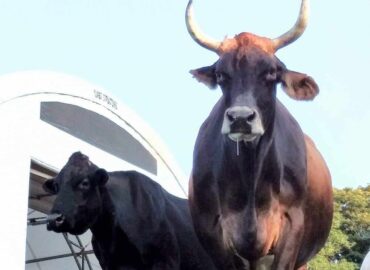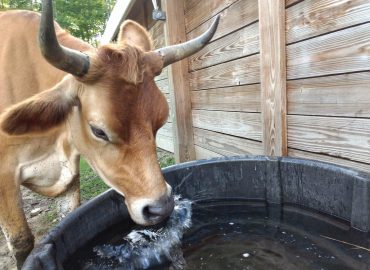VINE Sanctuary provides a haven for animals who have escaped or been rescued from the meat, dairy and egg industries or other abusive circumstances, such as cockfights or pigeon-shoots. Sanctuary residents include chickens, cows, ducks, doves, geese, pigeons, sheep, emus, and even a few parakeets. In addition to sheltering and advocating for animals, we conduct research and education aimed at creating systemic changes in agriculture, trade, and consumption as well as human attitudes about animals and the environment. We work within an ecofeminist understanding of the interconnection of all life and the intersection of all forms of oppression. Thus we welcome and work to facilitate alliances among animal, environmental, and social justice activists.
Our Story

Pattrice and Miriam Jones founded the Eastern Shore Chicken Sanctuary in 2000, shortly after finding a chicken in a ditch near their small property in the heart of poultry country. The sanctuary operated in rural Maryland for almost ten years, changing its name to Eastern Shore Sanctuary & Education Center to reflect its expanded population (ducks and turkeys and barn cats too!) and the expansion of its activities to include advocacy and education. During those years, we received national acclaim as the first sanctuary to successfully rehabilitate roosters used in cockfighting. We also worked actively within coalitions such as Global Hunger Alliance and Global Justice for Animals and the Environment.
In 2009, the sanctuary relocated to Vermont, in order to realize our dream of more land and the opportunity to rescue cows exploited by the dairy industry. In less than a year, thanks to hard work and generous donors, that dream came true as the first refugees from the dairy industry joined the refugees from the poultry, egg, and foie gras industries already living at the sanctuary. Our new name reflects our new location as well as our abiding commitment to the emotional and ethical principles that led to the rescue of that very first chicken.
Why VINE?
Sanctuary cofounder Miriam Jones once painted thick jungly vines all over the walls of a mud room. Wild grape, rose, and honeysuckle vines climbed the fences and wove through the trees of the original site of the sanctuary, in rural Maryland. Vines of all kinds also thrive at the sanctuary’s new home in Vermont, climbing trees and providing tasty berries for wild birds.

Vines both enact and represent the power of nature and the interconnectedness of all things. Vines pull down walls and snake through windows. They feed birds and serve as bridges between trees.
As an acronym, VINE stands for “Veganism is the Next Evolution.” What do we mean by that? In the widest sense of the word, “veganism” represents an essential next step for anybody who understands that the “intersection of oppressions” of which social justice activists so often speak exists within and is supported by the matrix of beliefs and practices that promote and excuse the exploitation of animals and the despoliation of the environment.
As sanctuary cofounder pattrice jones has said in countless speeches, “green means vegan” and “vegan means all animals.” Let’s take that one step at a time:
Green Means Vegan (and Vegan Means Green)
Given that animal agriculture is the top cause of water pollution, uses more water than all other human activities combined, and contributes more to climate change than any other economic sector (including transportation), we cannot “save the planet” while continuing to gorge ourselves on animal bodies and by-products. This is true whether or not we wish it were otherwise. Luckily, home-cooked vegan food is both cheaper and healthier than the meat-based fast-food diet to which so many of us have become addicted.
There’s still much work to be done to ensure that affordable fresh fruits and vegetables, as well as healthy grains, are available to everybody. That makes it all the more essential for those of us who have the wherewithal to do so to go vegan right away.
But it goes both ways: Those who have excised meat, dairy, and eggs from our diets can’t rest easy if our other choices (such as transportation or product consumption) waste scarce resources or generate excessive greenhouse gasses or other pollution. This is particularly true if we care about animals, who are on the front lines of the human war against nature—mutating due to pollution and dying due to climate change. It’s not just about compact florescent bulbs (although those are good); it’s about putting “reduce, reuse, and recycle” into practice every day in every way.
And that’s not all…
Vegan Means All Animals.
Any high school biology student can tell you: People are animals. So, if veganism means avoiding products that cause or are the result of animal exploitation or suffering, going vegan means avoiding sweatshop-sewn shoes and slave-harvested chocolate in addition to shunning meat, dairy, and eggs. Similarly, if we believe in the humane treatment of animals and we remember that people are animals, we must work to end all forms of social injustice.
That’s a lot! That’s why we also say:
Going Vegan Is Ongoing
Veganism is a process, not an accomplishment. In this world of globalized capitalistic competition, it’s virtually impossible to pass a single day without causing injury to some ecosystem or (human or nonhuman) animal. Hence, we refrain from proudly proclaiming ourselves to be vegan and instead encourage everyone to go vegan and go further.
Want to visit?

As a refuge for formerly abused animals, including survivors of petting zoos, VINE Sanctuary is not open to the public on a drop-in basis. However, we do offer four ways to tour the grounds and meet sanctuary residents. Please read this page carefully before contacting us about a potential visit.
Public Days
Four times each year, we open up the sanctuary grounds for a day of work and play. Anyone can sign up to come for a day of meaningful fun that will include some hours of volunteer work followed by a sanctuary tour and vegan snacks with sanctuary staff. By attending a public day, you will truly become part of our multispecies community, rather than just looking at the animals from a distance. Sign up for our newsletter and follow us on Facebook to be sure to be notified of the date of the next “party in the pasture”!
Personal Tours
If you are an activist or scholar whose work in some way aids nonhuman animals, then we are eager to ensure that your work is grounded in real relationships with animals. If your work requires you to confront the cruelties to which animals are subjected, then we are especially eager to offer you the opportunity to experience a slice of sanctuary life. Please use the contact form below to tell us about your work and when you would like to visit, and we will do our best to accommodate you.
Volunteer Groups
If you are a member of a student, youth, or community group that would like to come for a volunteer day, we would be delighted to have you visit and to personalize the experience to the interests of your group. The day would begin with a tour, continue with some hours of pitching in on sanctuary chores, and conclude with a discussion led by sanctuary staff. Use the contact form below to tell us about your group and when you would like to visit, and we will do our best to find a date that works for everybody.
Local Volunteers
If you live nearby and are interested in becoming a regular volunteer, we will be happy to give you a tour while discussing the possibilities. If you can find three friends who would like to join you for a one-time volunteer day, see the box to the left. We will be happy to treat your friendship circle as an organization. If you cannot volunteer regularly nor get a group together, then please do sign up for our newsletter and follow us on Facebook to be sure to be notified of the date of our next one-day volunteer event open to the public!




